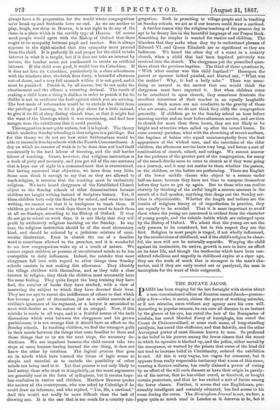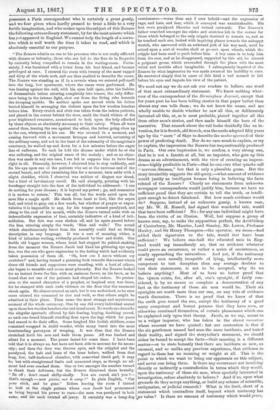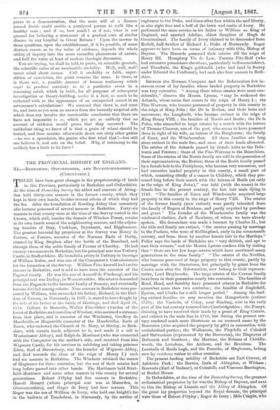THE ZOITAVE JACOB.
DARLS has been ringing for the last fortnight with stories about 1 a non-commissioned officer of Zouaves named Jacob—presum- ably a Jew—who, it seems, claims the power of working miracles,. or if not miracles, cures without any agency save his own
According to popular rumour, he can cure all diseases in an instant by the glance of his eye, has cured the heir of the Bonapartes of scrofula, has cured Marshal Fore)* of hemiplegia, has cured the Count de Chateauveillard, or some such name, of long-standing paralysis, has cured this chiffonier, and that fishwife, and the other Auvergnat porter of most diseases known to man. So profound is the belief in his powers among the lower classes that the street in which he operates is blocked up, and the police, either moved by the annoyance, or warned by the priests that cures of the kind did not tend to increase belief in Christianity, ordered the exhibition to end. All this is very vague, too vague for comment, but it appears from really respectable testimony that a man of this name, wearing a Zouave uniform, has really claimed a power of curing by an effort of the will such diseases as have their origin in paraly- sis of the nerves, that he has either cured, or deceived, or bought certain protectors, and that he has excited a sort of furore among the lower classes. Further, it seems that one Englishman; pre- sumably intelligent and certainly educated, has had access to his room during the cures. The Birmingham Journal is not, we fear, a paper quite so much read in London as it deserves to be, but it possesses a Paris correspondent who is certainly a great gossip, and we fear given when hardly pressed to trust a little to a very fertile imagination, and who makes upon the subject of this Zouave the following extraordinary statement, by far the most minute which has yet appeared in England. We cannot help the length of a narra- tive which is well worth the time it takes to read, and which is absolutely essential to our purpose.
"The Zouave admits no one to his presence who is not really afflicted with disease or infirmity, those who are led to the Rue do la Roquette by curiosity being compelled to remain in the waiting-room. Fortu- nately, I was furnished with a letter from his best friend, ant became privileged at once. I entered the room with twenty of the most ragged and dirty of the whole mob, and am thus enabled to describe the scone. The Zouave was standing as if in a reverie when we entered pell-mell into the long, low apartment, where the cures were performed. He was leaning against the wall, with his eyes half open, after the fashion of Sonnambala before entering completely into trance, the only differ- ence being in the intense light, shot out from the living orbs beneath the drooping eyelids. He neither spoke nor moved while his father busied himself in arranging the visitors upon the low wooden benches before him. Every crutch and stick was taken from the infirm patients, and placed in the corner behind the door, amid the timid whines of the poor frightened creatures, accustomed to look upon the help afforded by these objects as absolutely necessary to their safety. When all were seated thus, leaning the one against the other, the father going close up to the son, whispered in his ear. He was aroused in a moment, and coming forward with a movement brusque and hurried, savouring of the military camp, and not in the least of the solemnity of the magician's sanctuary, he walked up and down for a few minutes before the eager line of sufferers. To each he told the disease under which he or she was suffering, and the original cause of the malady ; and as no objec- tion was made in any one case, I am led to suppose him to have been right in all. Presently, however, I observed him to atop suddenly, and fix his eye upon one of the patients who sat at the extreme end of the second bench, and after examining him for a moment, turn aside with a slight shudder, which I observed was neither of disgust nor dread, but a kind of involuntary recoil. He said abruptly, pointing with his forefinger straight into the face of the individual he addressed : ' I can do nothing for your disease ; it is beyond my power ; go, and remember it is useless to return.' This was all, but the words acted upon the man like a magic spell. He shook from head to foot, like the aspen leaf, and tried to gasp out a few words, but whether of prayer or expos- tulation it is impossible to say, for his tongue seemed paralyzed, and clung to the roof of his mouth, while the Zouave turned aside with an indescribable expression of fear, certainly indicative of a kind of inti- midation. But this was soon shaken off, and he again passed before the line, uttering simply the words, 'Rise and walk!' The sound which simultaneously burst from the assembly could find no fitting description in any language. It was a sort of moaning whine, a kind of infantine wailing, evidently produced by fear and doubt. One feeble old beggar woman, whose head had stopped its palsied shaking from the moment the Zouave Jacob had fixed his glittering eye upon her, was the one who gave expression to the feeling which had evidently
taken possession of them all. Oh, how can I move without my crutches?' and, having turned a yearning look towards the corner where these old friends and supporters were standing, with a host of others, she, began to mumble and moan most piteously. But the Zouave looked for an instant down the line, with an ominous frown on his brow, as he found that not one of the patients had obeyed his orders. No preten- sion to the sacred character of a prophet, or inspired seer, was there, for he stamped with such rude violence on the floor that the casement shook again. He almost uttered an oath, but it was unfinished, as he once more uttered the command to rise and walk, so that others might be admitted in their place. Then came the most strange and mysterious moment of the whole ceremony. One by one did every individual seated upon those low wooden benches rise and stand erect. No words can describe the singular spectacle offered by this fearing, hoping, doubting crowd, as each one found himself standing firm upon the legs which for years had ceased to do their office. Some laughed like foolish children, some remained wrapped in stolid wonder, while many burst into the most heartrending paroxysm of weeping. It was then that the Zouave stretched forth his arm and bade them pause. All was hushed and silent for a moment. The pause lasted for some time. I have been told that it is always so, but have not been able to account for its neces- sity; and then the door was thrown open, and the crippled and the paralyzed, the halt and lame of the hour before, walked from that long, low, half-darkened chamber, with somewhat timid gait, it may be, but with straightened limbs and measured steps, as though no ail- ment had ever reached them. One or two amongst the number turned to thank their deliverer, but the Zonave dismissed them brutally. " Be off ; don't stand shilly-shally. You are cured, ain't you ?- that's enough — now pietiez moi is camp !" In plain English, " Cut your stick, and be gone." Before leaving the room I turned to look at the single patient whose case Jacob had pronounced as being beyond his power to cure—the man was paralyzed in both arms, and his neck twisted all :awry. It certainly was a hang-dog countenance—worse than any I ever beheld—and the expression of rage, and hate, and fear, which it conveyed was unmistakeable. His feet were paralyzed likewise and twined outwards. The Zouave's father searched amongst the sticks and crutches left in the corner for those which belonged to the only cripple destined to remain so, and as he touched each one, looked with inquiring glance towards the unhappy wretch, who answered with an awkward jerk of his wry neck, until he seized upon a sort of wooden shelf or go-cart upon wheels, which the cripple had been used to push before him. A boy came in to help him from his seat, and as he disappeared, supported by this aid, ho uttered a poignant groan, which resounded through the place with the most weird and terrible effect imaginable. I subsequently inquired of the Zouave by what impression he was made aware of his inability to cure. He answered simply that in cases of this kind a veil seemed to fall before his eyes and impede his view of the patient.
We need not say we do not ask our readers to believe one word of that most extraordinary statement. We know nothing what- ever of the correspondent of the Birmingham Journal, except that for years past he has been telling stories in that paper better than almost any one tells them ; we do not know his name, and are wholly unable to decide whether he saw all this, or deliberately invented all this, or, as is most probable, pieced together all this from other men's stories, and then made himself the hero of the narrative. That remark about the veil looks decidedly like an in- vention, for it is Scotch, old Scotch, was the mode adopted fifty years ago by the " seers " of Skye to describe the modus operandi of their power of predicting death. Nor do we care much to explain, or try to explain, the impression the Zouave has unquestionably produced in Paris. Our own impression is, we confess, a very strong one, that he is not a fanatic at all, but an impostor, who gets up this drama as an advertisement, with the view of creating an impres- sion—highly profitable in Paris—that he can cure what quacks call " nervous diseases," but that is only a plausible guess. But the story irresistibly suggests the old query,—what amount of evidence would justify an intelligent human being in believing the facts related of the Zouave ? Clearly no statements from unknown newspaper correspondents would justify him, because we have no sufficient proof that they are certain to tell the truth, or intelli- gent enough to detect falsehood. But how much evidence would do? Suppose, instead of an unknown gossip, a known man, say Mr. W. H. Russell, had signed that wonderful tale, would that have been sufficient? No ; for any one individual might have been the victim of an illusion. Well, but suppose a group of known men, say, to make the supposition perfect, the Archbishop of Canterbury, Mr. Maurice, Lord Stanley, Mr. Lewes, Professor Huxley, and Sir Henry Thompson—the operator, we mean—had added their signatures to the tale, would that have been sufficient? We believe one-half the educated men in Eng- land would say immediately no, that no evidence whatever could prove an occurrence, or rather a series of occurrences, so nearly approaching the miraculous. And yet, if the testimony of many men morally incapable of lying, intellectually more competent to test deception than any average doubter to test their statements, is not to be accepted, why do we believe anything? Most of us have no better proof that the Queen exists, for, after all, one's eyesight, if fairly con- sidered, is by no means so complete a demonstration of any fact as the testimony of those six men would be. Their six eyesights are worth more than our one, on any rule of evidence worth discussion. There is no proof that we know of that the earth goes round the sun, except the testimony of a good many competent and honest persons that they have seen, or otherwise convinced themselves, of certain phenomena which can be explained only upon that theory. Jacob, as we say, seems to us a vulgar impostor, who has taken in the clever raconteur whose account we have quoted ; but our contention is that if the six gentlemen named had seen the same incidents, and tested their reality, and signed the storyteller's statement, we should either be bound to accept the facts—their meaning is a different matter-:or to state honestly that there are incidents so new, so unusual, and so unlike any previous experience, that evidence in regard to them has no meaning or weight at all. This is the' point to which we want to bring our opponents on this subject, and never can bring them. Is there any occurrence not involving directly or indirectly a contracliction in terms which they would, upon the testimony of these six men, when specially interested in investigation, refuse absolutely to believe ? And if so, upon what grounds do they accept anything, or build any scheme of scientific, antiquarian, or judicial research? What is the limit, short of a statement which contradicts itself, beyond which testimony has 4no value ? Is there no amount of testimony which would prove,
prove to a demonstration, that the mere will of a Zouave named Jacob could enable a paralyzed person to walk like a healthy man ; and if so, how much ? or if not, what is our ground for believing a statement of a gradual cure of similar disease in any hospital in Great Britain ? Upon the answer to those questions, upon the establishment, if it be possible, of some distinct canon as to the value of evidence, depends the whole utility of inquiry into the more recondite phenomena of nature, and half the value at least of modern theologic discussion.
You are trying, we shall be told, to prove, on scientific grounds, the scientific value of an unscientific credulity. Well, well, well ! never mind about names. Call it credulity or faith, super- stition or conviction, the point remains the same. Is there, or is there not, a possible amount of human testimony which ought to produce certainty as to a particular event in a reasoning mind, which in truth, for all purposes of subsequent investigation or theory-building, makes it a fact, as much to be reckoned with as the appearance of an unexpected comet in an astronomer's calculations? We contend that there is, and must be, and have as yet seen no answer from the honestly sceptical side which does not involve the unscientific conclusion that there are facts not impossible in se, which yet are so unlikely that no amount of evidence would prove that they occurred. The unlikeliest thing we know of is that a grain of wheat should be buried, and then months afterwards shoot out sixty other grains —he was a speculator, the genius who first tried that !—but still one believes it, and acts on the belief. Why, if testimony to the unlikely has a limit to its force?
































 Previous page
Previous page